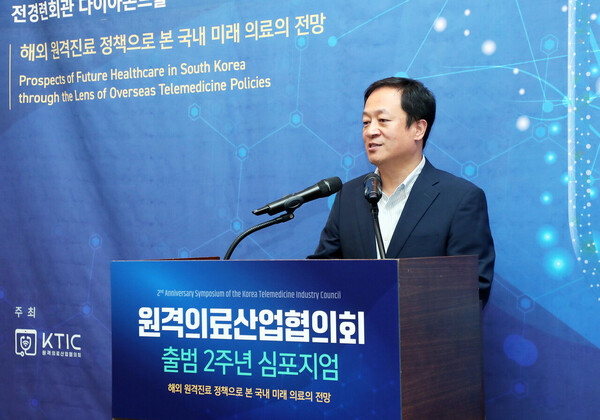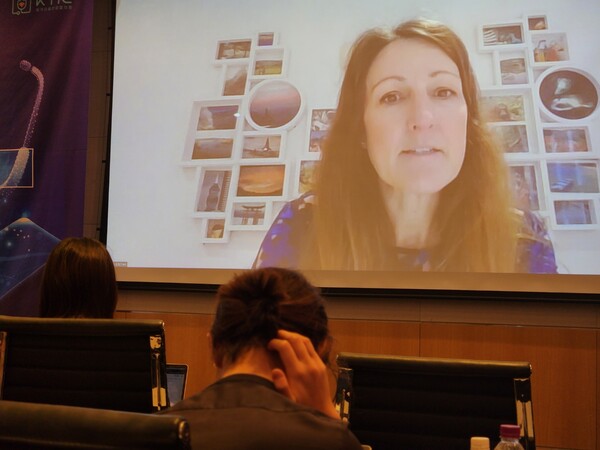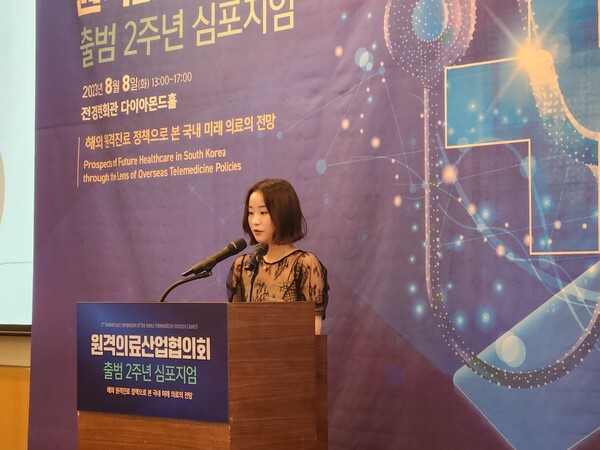Health experts highlighted Korea’s conservative view towards telemedicine, stressing the need to conduct further pilot projects to move the telemedicine industry forward.
The Korean Telemedicine Industry Council (KTIC) held a symposium inviting foreign and local medical industry experts to comment on Korea’s telemedicine policies, celebrating the second anniversary of its launch at the Federation of Korean Institutes in Yeouido, Seoul, Tuesday.

As the government’s non-face-to-face treatment pilot project ends this month, Professor Kwon Yong-jin of the Division of Public Health and Medical Service at Seoul National University Hospital (SNUH) explained that telehealth in Korea is only discussed to address the issue of accessibility but its value should spread further than this.
In addition to pilot projects, he referenced the American Medical Association’s “Return on Health” framework to prove telemedicine's other benefits such as cost efficiency, convenience, continuity of care, and preventative care.
Speaking on the issue of payment, Kwon said that it is possible to move away from the conventional payment methods of seeking health insurance.
“Remote technologies need to stimulate the government and individual consumers alike to purchase technologies that can provide health benefits regardless of insurance coverage,” said Professor Kwon.

Dr. Jo Kitchen, Consultant Rheumatologist and Physician of Royal Berkshire NHS Foundation Trust, also shared that telemedicine was spurred by the Covid-19 pandemic in the U.K. but its use has steadily continued into 2023 driven largely by the need to reduce costs.
“Up to 30 million outpatient visits a year can be avoided to save 1.1 billion pounds ($1.4 billion) annually,” said Kitchen.
She advocated for the use of telemedicine for clinically stable patients who have wide appointment intervals or require remote monitoring with low disease activity but admitted that its use could be restricted to first-time patients or patients that require clinical exams for accurate evaluation.
Kitchen also said Korea’s telemedicine policies were too restrictive. She noted that the scope should be expanded to everyone regardless of geography, unlike the current policy which limits it to older adults and those classified with disabilities. Also, she mentioned that the 30-day period should be extended to allow post-operative care with telemedicine as international evidence suggests that post-operative reviews can be carried out remotely beyond 30 days and are more likely to be stable.
“In the U.K., the majority of patients access telemedicine for a range of acute issues rather than chronic ailments, so I think limiting to chronic conditions alone misses out on the greater potential of telemedicine,” she said.

Medical Note Marketing Manager Risa Kim shared that the telemedicine industry in Japan is now primarily utilized by female users, addressing the ongoing year-by-year decline of gynecologists in the country.
Kim described the telemedicine service, LECINQ, which allows online consultations and enables pill prescriptions for premenstrual syndrome (PMS) treatment. The consumer first fills out a pre-application interview, is then assessed via videoconferencing, then pays, and can have the relevant medicines delivered within the same day or collected at the nearest pharmacy for prescriptions.
Song Tae-kyun, Director General for Global Healthcare at the Korea Health Industry Development Institute (KHIDI), also underscored the importance of telemedicine to attract more foreign patients.
“Non-face-to-face care also needs to be institutionalized by revising the diplomatic act to enhance the demand for Korean medical services,” Song said. “Likewise, to facilitate pre-consultation, relevant laws need to be put in place to facilitate the delivery of medical care overseas.”
Related articles
- ‘60,000 illegal prescriptions of narcotics made during temporary telemedicine period’
- No success stories for digital therapies or telemedicine – at least so far
- Government begins pilot telemedicine project to institutionalize it in a year
- Korea's telemedicine pilot project backfires, putting everyone at stake
- Hospitals to check patients’ eligibility for remote care from next month
- Guideline for telemedicine unveiled outlining liability, limits on first visits

